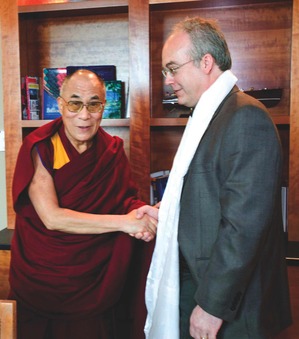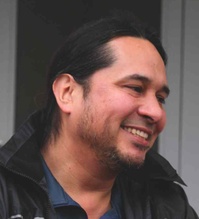 UO economist Bill Harbaugh is interested in how pleasure can be derived from being charitable. This makes his work of interest to no less than the Dalai Lama.
UO economist Bill Harbaugh is interested in how pleasure can be derived from being charitable. This makes his work of interest to no less than the Dalai Lama.
Unlike some religious leaders, the Dalai Lama sees religion and science as complementary forces that can help us understand our increasingly complicated world. Next month, His Holiness will be presiding over a roundtable discussion entitled Compassion in Economics, where Harbaugh will be a featured participant. The panel will take place at the 20th annual Mind and Life Conference, April 9 -11 in Zurich.
The topic of the conference is the role of altruism and compassion in economic systems, a conscious break from the usual emphasis on competition in economics.
Harbaugh's current research, much of which is jointly conducted with UO psychologist Ulrich Mayr, is a mix of neuroscience and economics. Harbaugh has found that the notion of charitable giving activates pleasure centers in the brain -- but at different levels for different people. The source of these differences is something he's still investigating, but the measurements help predict whether people will actually donate or not.
There are some interesting outliers in his research, such as subjects who show no pleasure at the idea of giving but still donate anyway. "In some ways, you might say that's altruism in its truest form, altruism with no self benefit," he says. "This is especially interesting to the philosophers and the Buddhists: What matters more -- your actions or your intent?"
- Marc Dadigan


 When the volcano erupted, a UO professor discovered that local residents consoled themselves through song.
When the volcano erupted, a UO professor discovered that local residents consoled themselves through song.
 Join UO neuroscientists as they bring the host of the PBS series, The Human Spark into their brain research lab.
Join UO neuroscientists as they bring the host of the PBS series, The Human Spark into their brain research lab.  Temple Grandin, perhaps the world's best known person with autism, drew an overflow crowd to her UO talk.
Temple Grandin, perhaps the world's best known person with autism, drew an overflow crowd to her UO talk.

 Watch a slideshow about Elena Rodina's journalistic globetrotting, from the Arctic Circle to Cuba.
Watch a slideshow about Elena Rodina's journalistic globetrotting, from the Arctic Circle to Cuba.